The Smart Medication Adherence Sensors Market is estimated to be valued at USD 26.8 billion in 2025 and is projected to reach USD 77.6 billion by 2035, registering a compound annual growth rate (CAGR) of 11.2% over the forecast period.
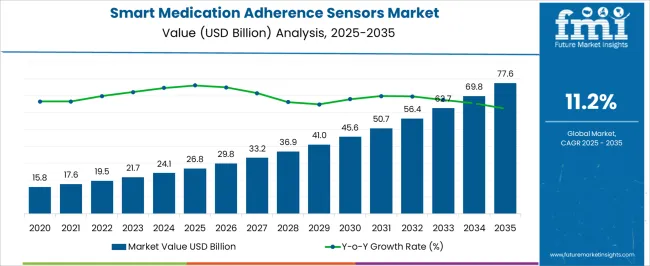
| Metric | Value |
|---|---|
| Smart Medication Adherence Sensors Market Estimated Value in (2025 E) | USD 26.8 billion |
| Smart Medication Adherence Sensors Market Forecast Value in (2035 F) | USD 77.6 billion |
| Forecast CAGR (2025 to 2035) | 11.2% |
The Smart Medication Adherence Sensors market is witnessing steady growth driven by the increasing focus on patient-centered care and the adoption of digital health technologies. These sensors are being used to monitor patient medication intake, ensuring adherence to prescribed therapies and reducing the risk of complications from missed or incorrect doses.
The market growth is being influenced by rising chronic disease prevalence, the expansion of home healthcare services, and the demand for data-driven healthcare solutions that support clinical decision-making. Integration of these sensors with mobile applications and cloud-based monitoring platforms has enabled real-time feedback to both patients and healthcare providers, improving treatment outcomes.
Furthermore, healthcare systems are increasingly emphasizing preventive care and reducing hospital readmissions, which supports the adoption of smart medication adherence solutions With ongoing advancements in sensor technology, miniaturization, and interoperability with electronic health records, the market is expected to continue expanding, presenting opportunities for both device manufacturers and healthcare providers to enhance patient outcomes and reduce overall healthcare costs.
The smart medication adherence sensors market is segmented by product type, distribution channel, and geographic regions. By product type, smart medication adherence sensors market is divided into Hardware Centric Smart Medication Adherence Sensors and Software Centric Smart Medication Adherence Sensors. In terms of distribution channel, smart medication adherence sensors market is classified into Hospital Pharmacies, Retail Pharmacies, and Online Pharmacies. Regionally, the smart medication adherence sensors industry is classified into North America, Latin America, Western Europe, Eastern Europe, Balkan & Baltic Countries, Russia & Belarus, Central Asia, East Asia, South Asia & Pacific, and the Middle East & Africa.
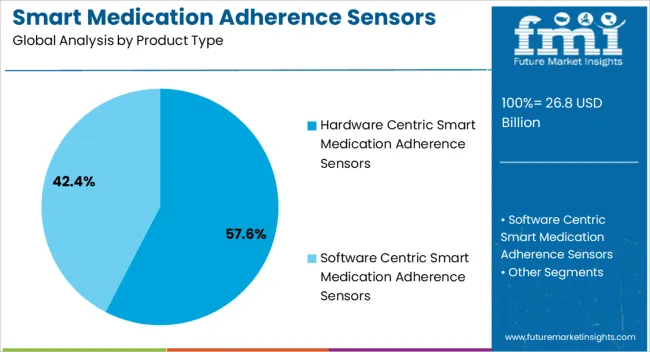
The hardware centric smart medication adherence sensors segment is projected to hold 57.60% of the overall market revenue in 2025, making it the leading product type. This dominance is being driven by the reliability and accuracy offered by hardware-based devices, which provide precise monitoring of medication intake events.
The adoption of these sensors has been supported by their ability to operate independently of external software and connectivity, offering consistent performance even in areas with limited digital infrastructure. Healthcare providers are increasingly preferring hardware centric solutions for patients with complex medication regimens, as they reduce the risk of errors and improve adherence tracking.
The robust nature of hardware devices, along with integration capabilities for data logging and reporting, has further enhanced their adoption As technological improvements continue, including miniaturization, battery life extension, and enhanced user-friendliness, the hardware centric segment is expected to retain its leadership in the smart medication adherence sensors market, delivering tangible benefits to both patients and providers.
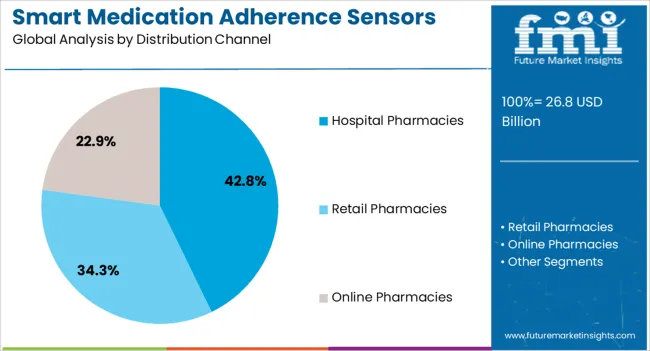
The hospital pharmacies distribution channel segment is expected to capture 42.80% of the smart medication adherence sensors market revenue in 2025, establishing it as the dominant channel. This leadership is being driven by hospitals’ strategic focus on patient safety and medication management, with pharmacies acting as key points for dispensing, monitoring, and counseling patients on sensor-enabled adherence devices.
The segment has benefited from the integration of smart sensors into hospital workflows, allowing pharmacists to track real-time adherence data and intervene promptly in cases of non-compliance. Additionally, hospital pharmacies provide education, device support, and guidance for patients, increasing adoption rates compared with other channels.
As healthcare providers continue to emphasize quality metrics and patient-centered care, the hospital pharmacy channel remains crucial for introducing smart medication adherence sensors into clinical practice The strong institutional infrastructure, coupled with established patient access and monitoring capabilities, is anticipated to support sustained growth and reinforce the channel’s dominant position in the market.
Non-adherence of medication is widespread problem, where a patient fails to follow the medication schedule which results into the delayed or no cure of the disease which may lead to death in fatal cases. For the best possible outcome of the treatment, adherence to follow the medication schedule is required. Non-adherence significantly increases healthcare costs as a result of disease-related complications and hence to overcome this problem many companies are focusing on developing smart medication adherence sensors.
Smart medication adherence sensors often comes with the system where patient specific medication schedule is followed through the technologically advanced means. Smart medication adherence sensors is useful in the patients such as who live in assisted living or old aged patients who often forgets about the medication schedule. Various companies are manufacturing the smart medication adherence sensors embedded drugs for the better monitoring of the dose. Smart medication adherence sensors not only track the dose but also helps to detect dose timing, physiologic response such as activity, heart rate, skin temperature and rest, etc.
Around 50% of prescribed medications remain unadministered, which affects the healthcare cost as well as therapeutic effect of the drug indicating the significant market potential of smart medication adherence sensors. Smart medication adherence sensors technology helps in monitoring about patient taking either oral medications or medical injections at home or any facility.
The data is automatically uploaded, which can be review healthcare provider and can be tracked in real-time, this multidimensional approach driving smart medication adherence sensors market growth.
The aging population of the world is expected to grow at 250% till 2050 as compared to 2025 and old age brings a lot of health complication, hence to have a healthy aged population smart medication adherence sensors can play a significant role. The smart medication adherence sensors market is currently growing at the fastest rate possible due to rapidly evolving technologies in the field and increasing prevalence of chronic diseases where frequent patient monitoring becomes inevitable.
Various manufacturing companies are focusing on the patient specific approach rather than traditional the physician specific approach and patient specificity plays important role in the smart medication adherence sensors market by offering most desired product. Whereas, comparatively high price of smart medication adherence sensors and low penetration of smart medication adherence sensors in developing countries can hamper the growth of smart medication adherence sensors market.
Globally increasing prevalence of chronic illness and aging population mostly living away from healthcare facility expected to drive the growth of smart medication adherence sensors market. By the product type software centric smart medication adherence sensors expected to dominate the market. By distribution channel retail pharmacies expected to dominate smart medication adherence sensors market.
The manufacturers in the smart medication adherence sensors market are focusing on developing technologically more advanced products for better patient compliance. Various manufacturers are also focusing on developing cost effective smart medication adherence sensors. The manufacturers in the smart medication adherence sensors market are mainly focusing on developed and rapidly developing economies for their product footprint expansion.
North America is the most lucrative smart medication adherence sensors market due to higher product penetration and greater patient adoption. Europe is expected to be second most lucrative smart medication adherence sensors market due to rapidly aging population and comparatively higher healthcare expenditure.
Latin America smart medication adherence sensors market is expected to witness steady growth due to improving treatment seeking rate as well as increasing adoption of high end monitoring methods. Asia-Pacific is regarded as emerging smart medication adherence sensors market due emerging economies such as India and China coupled with manufacturing of cost effective products. MEA remains least lucrative smart medication adherence sensors market due to lowest adoption.
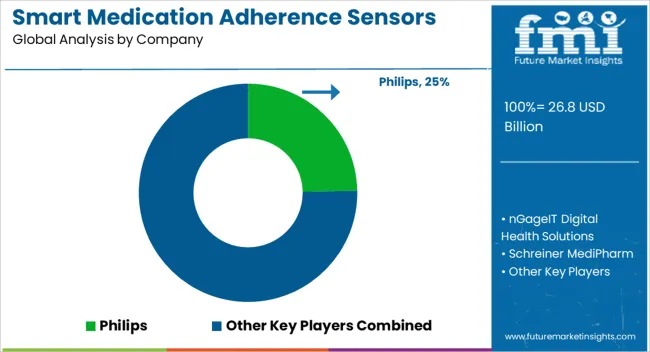
Some of the global key participants operating in smart medication adherence sensors market are: nGageIT Digital Health Solutions, Schreiner MediPharm, PillDrill, Inc., HealthPrize Technologies, AdhereTech, Koninklijke Philips N.V., McKesson Corporation, Johnson & Johnson Services, Inc. and others
The research report presents a comprehensive assessment of the market and contains thoughtful insights, facts, historical data, and statistically supported and industry-validated market data. It also contains projections using a suitable set of assumptions and methodologies. The research report provides analysis and information according to market segments such as geographies, application, and industry.
The report is a compilation of first-hand information, qualitative and quantitative assessment by industry analysts, inputs from industry experts and industry participants across the value chain. The report provides in-depth analysis of parent market trends, macro-economic indicators and governing factors along with market attractiveness as per segments. The report also maps the qualitative impact of various market factors on market segments and geographies.
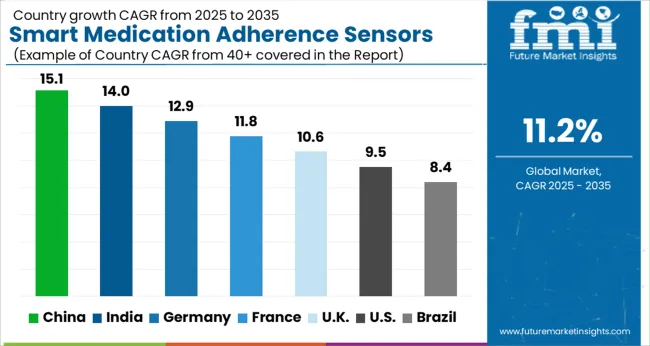
| Country | CAGR |
|---|---|
| China | 15.1% |
| India | 14.0% |
| Germany | 12.9% |
| France | 11.8% |
| UK | 10.6% |
| USA | 9.5% |
| Brazil | 8.4% |
The Smart Medication Adherence Sensors Market is expected to register a CAGR of 11.2% during the forecast period, exhibiting varied country level momentum. China leads with the highest CAGR of 15.1%, followed by India at 14.0%. Developed markets such as Germany, France, and the UKcontinue to expand steadily, while the USA is likely to grow at consistent rates. Brazil posts the lowest CAGR at 8.4%, yet still underscores a broadly positive trajectory for the global Smart Medication Adherence Sensors Market. In 2024, Germany held a dominant revenue in the Western Europe market and is expected to grow with a CAGR of 12.9%. The USA Smart Medication Adherence Sensors Market is estimated to be valued at USD 9.6 billion in 2025 and is anticipated to reach a valuation of USD 23.7 billion by 2035. Sales are projected to rise at a CAGR of 9.5% over the forecast period between 2025 and 2035. While Japan and South Korea markets are estimated to be valued at USD 1.3 billion and USD 781.0 million respectively in 2025.
| Item | Value |
|---|---|
| Quantitative Units | USD 26.8 Billion |
| Product Type | Hardware Centric Smart Medication Adherence Sensors and Software Centric Smart Medication Adherence Sensors |
| Distribution Channel | Hospital Pharmacies, Retail Pharmacies, and Online Pharmacies |
| Regions Covered | North America, Europe, Asia-Pacific, Latin America, Middle East & Africa |
| Country Covered | United States, Canada, Germany, France, United Kingdom, China, Japan, India, Brazil, South Africa |
| Key Companies Profiled | Philips, nGageIT Digital Health Solutions, Schreiner MediPharm, PillDrill, HealthPrize Technologies, AdhereTech, McKesson, and Johnson & Johnson |
The global smart medication adherence sensors market is estimated to be valued at USD 26.8 billion in 2025.
The market size for the smart medication adherence sensors market is projected to reach USD 77.6 billion by 2035.
The smart medication adherence sensors market is expected to grow at a 11.2% CAGR between 2025 and 2035.
The key product types in smart medication adherence sensors market are hardware centric smart medication adherence sensors and software centric smart medication adherence sensors.
In terms of distribution channel, hospital pharmacies segment to command 42.8% share in the smart medication adherence sensors market in 2025.






Our Research Products

The "Full Research Suite" delivers actionable market intel, deep dives on markets or technologies, so clients act faster, cut risk, and unlock growth.

The Leaderboard benchmarks and ranks top vendors, classifying them as Established Leaders, Leading Challengers, or Disruptors & Challengers.

Locates where complements amplify value and substitutes erode it, forecasting net impact by horizon

We deliver granular, decision-grade intel: market sizing, 5-year forecasts, pricing, adoption, usage, revenue, and operational KPIs—plus competitor tracking, regulation, and value chains—across 60 countries broadly.

Spot the shifts before they hit your P&L. We track inflection points, adoption curves, pricing moves, and ecosystem plays to show where demand is heading, why it is changing, and what to do next across high-growth markets and disruptive tech

Real-time reads of user behavior. We track shifting priorities, perceptions of today’s and next-gen services, and provider experience, then pace how fast tech moves from trial to adoption, blending buyer, consumer, and channel inputs with social signals (#WhySwitch, #UX).

Partner with our analyst team to build a custom report designed around your business priorities. From analysing market trends to assessing competitors or crafting bespoke datasets, we tailor insights to your needs.
Supplier Intelligence
Discovery & Profiling
Capacity & Footprint
Performance & Risk
Compliance & Governance
Commercial Readiness
Who Supplies Whom
Scorecards & Shortlists
Playbooks & Docs
Category Intelligence
Definition & Scope
Demand & Use Cases
Cost Drivers
Market Structure
Supply Chain Map
Trade & Policy
Operating Norms
Deliverables
Buyer Intelligence
Account Basics
Spend & Scope
Procurement Model
Vendor Requirements
Terms & Policies
Entry Strategy
Pain Points & Triggers
Outputs
Pricing Analysis
Benchmarks
Trends
Should-Cost
Indexation
Landed Cost
Commercial Terms
Deliverables
Brand Analysis
Positioning & Value Prop
Share & Presence
Customer Evidence
Go-to-Market
Digital & Reputation
Compliance & Trust
KPIs & Gaps
Outputs
Full Research Suite comprises of:
Market outlook & trends analysis
Interviews & case studies
Strategic recommendations
Vendor profiles & capabilities analysis
5-year forecasts
8 regions and 60+ country-level data splits
Market segment data splits
12 months of continuous data updates
DELIVERED AS:
PDF EXCEL ONLINE
Smart Medication Packaging Market
Smart Grid Sensors Market
Medication Adherence Packaging Market
Smart Vision Sensors Market Analysis - Size, Share, and Forecast Outlook 2025 to 2035
Smart Home Water Sensors & Controllers Market Trends & Forecast 2025 to 2035
Smart Meeting Pod Market Size and Share Forecast Outlook 2025 to 2035
Smart Electrogastrogram Recorder Market Size and Share Forecast Outlook 2025 to 2035
Smart Aerial Work Robots Market Size and Share Forecast Outlook 2025 to 2035
Smart Bladder Scanner Market Size and Share Forecast Outlook 2025 to 2035
Smart School Bus Platform Market Size and Share Forecast Outlook 2025 to 2035
Smart Home Wireless Smoke Detector Market Size and Share Forecast Outlook 2025 to 2035
Smart Bus Platform Market Size and Share Forecast Outlook 2025 to 2035
Smart Vision Processing Chips Market Size and Share Forecast Outlook 2025 to 2035
Smart Touch Screen Scale Market Size and Share Forecast Outlook 2025 to 2035
Smart Magnetic Drive Conveyor System Market Size and Share Forecast Outlook 2025 to 2035
Smart Wheelchair market Size and Share Forecast Outlook 2025 to 2035
Smart Mining Technologies Market Size and Share Forecast Outlook 2025 to 2035
Smart Parking Market Size and Share Forecast Outlook 2025 to 2035
Smart Digital Valve Positioner Market Forecast and Outlook 2025 to 2035
Smart Card IC Market Size and Share Forecast Outlook 2025 to 2035

Thank you!
You will receive an email from our Business Development Manager. Please be sure to check your SPAM/JUNK folder too.
Chat With
MaRIA